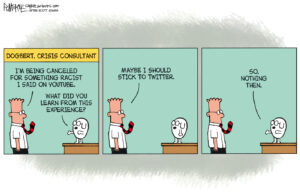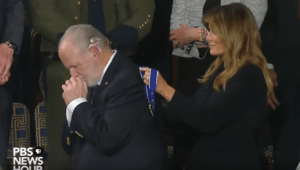Ronnie’s Legacy
Many of our nation's latest scandals, from the abject failure to rebuild New Orleans to the abuse of veterans at Walter Reed, are the logical result of a contempt for government so zealously implemented by Ronald Reagan and his political descendants.WASHINGTON — The line was almost certain to give Ronald Reagan’s adoring audiences a reason to smile. “The nine most terrifying words in the English language,” Reagan would quip, “are: ‘I’m from the government, and I’m here to help.’ ”
He was, of course, entirely serious. No catchphrase better captures the conservative revolt against government that lifted Reagan to the White House and has come to dominate American politics for the better part of the past three decades.
Now the joke is on us.
A culture of contempt for government infects those who govern. It has shamed America and left the government itself in a shambles.
It is seen in the callous maltreatment of gravely wounded soldiers who’ve returned from Iraq. The scandal of Walter Reed Army Medical Center is compounded by a veterans’ healthcare system starved of funds needed to accommodate a new generation of the disabled and disfigured — a shortfall that has long been clear to those who use the system and who lobby for veterans, but not to those who blindly protect the Bush administration’s tax cuts above all else.
These failures unfold alongside the revelations that at least six of eight U.S. attorneys who were fired last year were dumped in an apparent administration effort to dispense with those it believed were somehow lacking in fealty to its political agenda, or were insufficiently partisan to suit some Republican members of Congress, or, in one case, was merely considered expendable because the White House wanted to open up a slot for a political crony.
It is the same cavalier incompetence that led to the debacle of the Hurricane Katrina response, its nightmarish aftermath still lived by the uprooted and the abandoned. The overlap between the twin tragedies of Katrina and Walter Reed is not imaginary. Rep. Henry Waxman, D-Calif., has uncovered an internal Army document outlining how the hiring of a private contractor to provide support services at the military hospital led to an exodus of skilled government workers and put patient care “at risk of mission failure.” As it happens, the very same contractor had botched its role in the response to Hurricane Katrina.
And it is the same malignancy that caused the office of the vice president to turn against a career CIA operative — disclosing her identity and ruining what was left of her career — in an effort to discredit her husband, himself a career diplomat who’d won honors for his State Department work. One sordid aspect of the Valerie Plame affair is the zeal with which Vice President Dick Cheney’s office sought to smear two people who’d dedicated their lives to serving their country.
Even as the wounded Iraq veterans with their black eye-patches and their wheelchairs were testifying before congressional committees, Cheney was in full blame-shifting mode. Promising “no excuses, only action” to fix military hospital problems, Cheney declared to the Veterans of Foreign Wars that “the federal bureaucracy will not slow that action down.”
Ah, those nameless, faceless bureaucrats! They are still the scapegoats.
Except that the chronic breaches of faith that define the Bush era haven’t been carried out by civil servants. They’re the handiwork of politicians and appointees who have bullied and overruled everyone from government climate scientists and drug-safety experts to intelligence analysts and diplomats.
Reagan isn’t responsible for the Bush administration’s unending loop of errors and gross malfeasance. No one in 1980 could anticipate that a generation later, a president would govern not only with an ideological antipathy toward government but with such disdain for it that his administration refuses to finance its basic functions or to even accept the expertise of career public servants. Still, the war against government this White House has waged couldn’t have been carried out without the political groundwork laid by decades of anti-government rhetoric.
Conspiracy theorists might well conclude that President Bush set out to destroy the federal government’s credibility so voters would never again turn to it for assistance. An abiding distrust of government still is evident in opinion polls. Even so, the public increasingly desires government help with healthcare, retirement and other bulwarks against economic insecurity.
The contradiction is itself a fixture of our political culture, and not a matter easily sorted out in campaign sound bites. The best we can hope for is a collective soul-searching that examines this question: Where would we turn if our own home was submerged, or our own child’s limbs and life were shattered by war?
Marie Cocco’s e-mail address is mariecocco(at symbol)washpost.com.
© 2007, Washington Post Writers Group
Your support matters…Independent journalism is under threat and overshadowed by heavily funded mainstream media.
You can help level the playing field. Become a member.
Your tax-deductible contribution keeps us digging beneath the headlines to give you thought-provoking, investigative reporting and analysis that unearths what's really happening- without compromise.
Give today to support our courageous, independent journalists.






You need to be a supporter to comment.
There are currently no responses to this article.
Be the first to respond.